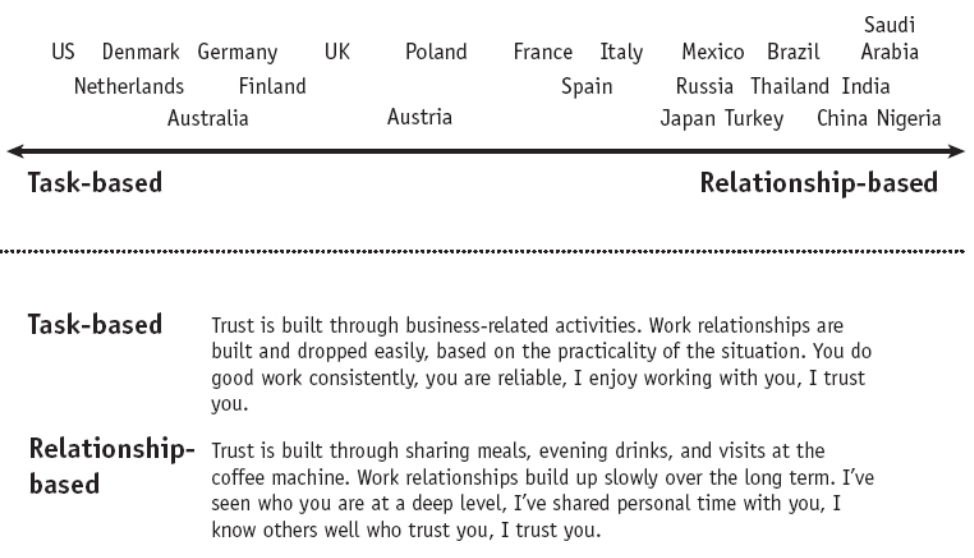Have you ever been in a situation where you wanted to get straight to the point at work while your counterpart seemed to “drag” the process? What about vice versa: was someone rushing you to sign the work contract even if you did not know and trust the person yet?
Likely what you have witnessed was a difference between your and that person’s cultures.
In her book “Culture Map,” Erin Meyer talks about how the culture we come from affects us and our work ways. In this post, I’ll share my favorite learnings after reading this book.
Trusting scale
I found one of the scales mentioned in the book especially useful. That scale is the trusting scale. It’s very interesting to discover how it differs in task-based versus relationship-based cultures.

Illustration of Trusting Scale in Erin Meyer's "Culture Map"
In task-based cultures, trust is built through business-related activities. If you have a work task together and work on it efficiently - this is how you start trusting each other.
While in relationship-based cultures, trust is built through forming relationships first while dining together, having personal discussions, or activities together. Then people feel like they can trust each other at work, too.
The US, UK, and Germany are some countries that have a task-based culture. People from there usually want to put personal matters aside first or do not consider discussing these as “professional.” Instead, they build work trust by collaborating on tasks and getting straight to the point.
While countries like Mexico, China, and Nigeria fall on another side of the scale: these cultures are highly relationship-based. If you work with people from those cultures, you should better carve out some time for a proper lunch break or dinner after work. It matters a lot to build a strong relationship first. Only then can the trust be established.
You may have witnessed examples of both cultures. For example, task-based culture representatives prefer to talk only about work and avoid personal topics. They may even take “efficient” lunch breaks combining them with work tasks. They often get annoyed by the relationship-based culture colleagues who seem to “care more about their long lunch breaks than actually doing the work.” In contrast, relationship-based colleagues may not trust others easily and like to take their time getting to know each other first. Where do these differences come from?
What influenced cultures to be task-based or relationship-based?
Historically, task-based cultures are in countries with a robust legal system. In those countries, if you have a work agreement supported by a contract, the system is there to protect you in case someone does not respect the contract. In contrast, relationship-based cultures come from countries with a legal system they cannot trust, so it is more reliable to do business with a trustworthy person rather than just having a contract with a stranger.
In Nigeria, you would rather trust your familiar cousin than a stranger who tells you that they can do the work. Knowing someone personally allows people to conclude if that person is trustworthy. Erin Meyers writes: “This provides a safety net that replaces the role of the legal system in more developed countries.”
When it comes to trust in working with others, we have to consider their background and what matters to them. In the end, we all want to do our work as best as we can.
Investing in relationships is going to help you save time
Coming from task-based cultures, we may feel like relationship-based cultures are “slowing the work down,” but… are they?
As Erin Meyer says: “Investing time in establishing trust will often save time (and many other resources) in the long run. <…> If you find yourself wondering in exasperation, “Why do I have to spend so much time dining and socializing with potential clients? Why can’t we just get down to business and sign a contract?” remember - in many cultures, the relationship _is your contract. You can’t have one without the other.”_
I love the idea of tackling our differences, finding ways of work, and slowing down before we speed up (that’s a great reference to the message sent by the book “Accelerate” as well).
We will go even faster if we learn how to work with each other in diverse teams.